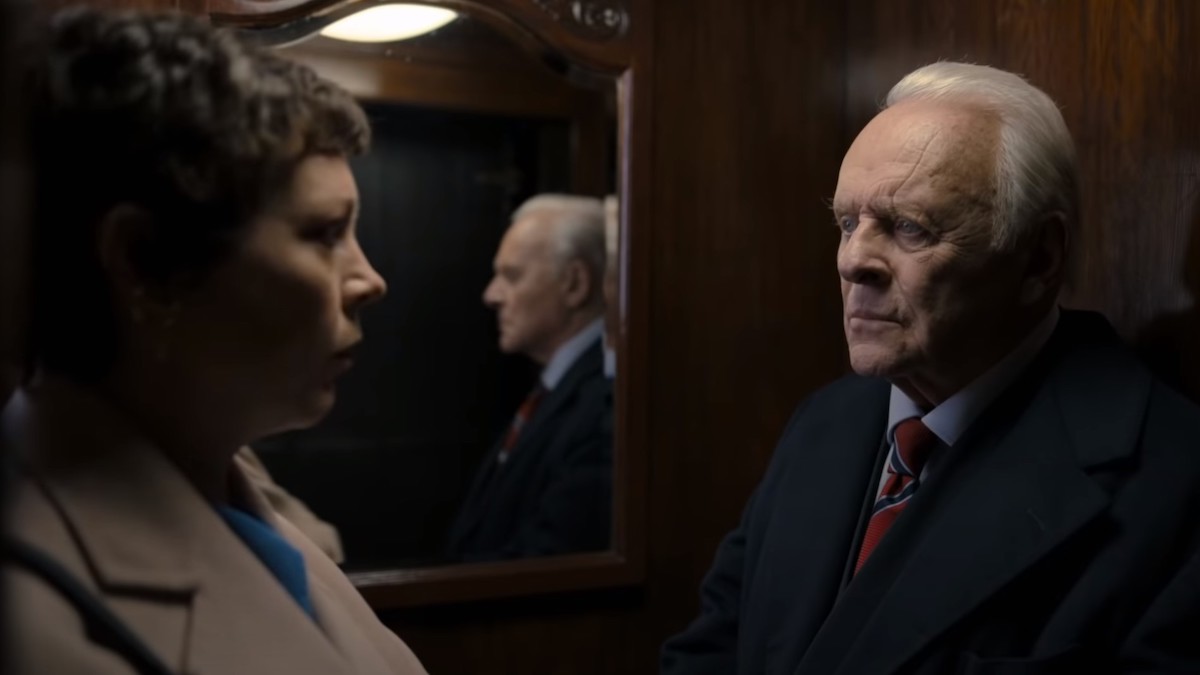
Losing a family member is one of the worst pains imaginable. Losing them slowly as their cognitive abilities decline while they physically remain is an entirely different experience that hurts all the same. An adaptation of a stage play takes us head-long into the experience of an elder experiencing dementia in one of the most immersive ways ever put to film. The Father drops us in with Anthony (Anthony Hopkins) an older man living in the United Kingdom who refuses all assistance from his daughter Anne (Olivia Colman) as he ages and starts to deteriorate mentally. As Anthony tries to make sense of his changing circumstances, he begins to doubt his loved ones, his own mind and even the fabric of his reality.
The mind-bending script and cinematography featured in The Father makes this perhaps the best depiction of neurological deterioration ever put to film. Director Florian Zeller employs misdirection with audience whether it’s switching out actors for the people in Anthony’s life, changing the facts of the story from one minute to the next, or changing Anthony’s surroundings cleverly confuses the audience just as much as the character. The mind-bending narrative structure and accompanying cinematography are engaging and well-executed, a testament to the screenwriting of Christopher Hampton and Zeller’s skill as a director. It could have been extremely easy to drift into confusion and a muddled story with such constantly shifting elements, but pulling it off in a way that is both entertaining as a film and empathetic for how sufferers of dementia or other mental deterioration diseases must deal with the confusion of slowly losing their grasp of reality. makes The Father a triumph in filmmaking. Viewers are placed directly into Anthony’s shoes, having to question every shot we’ve seen or line of dialogue we hear, creating a level of empathy that makes the reality of Alzheimer’s and the confusion, paranoia, and panic of the disease feel all too real.
The Father also does well in depicting the effects on family as they try to care for a sick elderly family member. For this film, it’s the strain that Anthony’s condition puts on Anne’s relationship with her new partner Paul (Rufus Sewell) as he becomes frustrated by her parental obligations that get in the way of their own budding family. Caring for an ailing family member creates stress not just for the person responsible for their care, but for those around them who watch them struggle or whose time with them is lessened as a result. The film also makes clear the cruelty of the disease for the sufferer with how it can reopen painful old wounds for all involved by erasing the memory of past loss. Throughout the film, Anthony inquires of the whereabouts of his other daughter who is long deceased. The lost memory of her death and his constant yearning for her is not only a painful twist for Anthony, but also for Anne as she must both relive the loss and think about what to tell her father about where her sister has gone. It’s this sense of dread that really highlights the fear of such diseases and how they can effect everyone surrounding those who are afflicted.
Much of this film’s buzz and press has centered around the performance of its lead, the legendary Sir Anthony Hopkins and for good reason. Hopkins’ portrayal of a prideful old man who is slipping into a mind state that not only does he not understand, but fails to even recognize is one of the best ever filmed in personifying what it is like to slowly succumb to dementia. Hopkins is at varying times defiant, confused, and hurt and the changes in the world around him, running the emotional gamut one would expect from someone suddenly afflicted with such a disease. His performance is sure to be a moving one for anyone that has had to watch a loved one slowly slip away while still being physically close enough to touch. On the end, Olivia Colman also does a wonderful job in her portrayal of a daughter slowly losing her father and trying to keep her life on balance while trying to salvage what she can for her only living parent.
The Father is part thriller, part mystery, and part horror film as we watch confused alongside an elderly man slowly losing his grasp of what is real and what isn’t, questioning his own sanity, and eventually is forced to come to grips with the fact that the freedom and independence that we come to take for granted after decades as adults is slowly slipping away. Anthony Hopkins is masterful in his portrayal of the effects of dementia mentally and emotionally while Florian Zeller displays an equally masterful skill behind the camera in bringing those effects to life and creating an empathetic depiction for the audience to experience alongside the main character. The production design and cinematography transport us visually into what these diseases must feel like evoking an emotional response that makes the film that much more impactful. For the millions that have had to face this situation with a family member, The Father is sure to stay with them well after the final credits roll.
Image: Sony Pictures Classics

